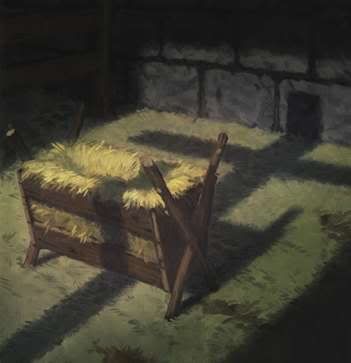Last week, Ron Rockey preached about "What Rudolph the Red Knows" as we continued our Advent series Rediscover Christmas: Finding the True Christmas Story in Classic TV Christmas Specials.
Ron reminded us of C. S. Lewis's famous formulation in Surprised by Joy, in the autobiographical account (spiritual autobiography, like Augustine's Confessions) of Lewis's conversion to Christ, that every story (or myth) that is even partly true draws in some way on The One True Story. The Story of Jesus the Christ found in the gospels is, according to Lewis, "the true myth, myth become fact."
[With the recent release of the Narnia films, there has been a spike in interest in Lewis. See "Myth Matters" (for an account of Lewis's 1944 essay, "Myth Became Fact," in God in the Dock: Essays on Theology and Ethics) and see Brent Plate's "Chronicling C.S. Lewis: Marketing and Mythology."]

(Image Source, http://www.nd.edu/~ndethics/images/rotation/inspires/lewis.jpg
Surprised by Joy (the account of 1931, when Lewis would have been 33 years old)
If ever a myth had become fact, had been incarnated, it would be just like this. And nothing else in all literature was just like this. [...] And no person was like the Person it depicted; as real, as recognisable, through all that depth of time, ...yet also numinous, lit by a light from beyond the world, a god. But if a god - we are no longer polytheists - then not a god, but God. Here and here only in all time the myth must have become fact; the Word, flesh; God, Man. This is not 'a religion', nor 'a philosophy'. It is the summing up and actuality of all of them.'(Surprised by Joy, 1955, pp. 188-189.)
As we heard from the parables (stories) in week one, and as we heard again from Ron about the prophet Isaiah's oracle and the Gospel of John's introit last week, the story of Christ is the Story with a difference. It provokes in us a reaction--not always positive--and it makes a claim to truth and a claim on us at the same time. It is "personally threatening" of our present way of life. It has the potential to transform us. In the words of Gary Dorrien ("The ‘Postmodern’ Barth? The Word of God As True Myth"), "[i]f the Christ [story] is true in the way that it claims to be true, it stands to other [stories] as the fulfillment of their promise and truth. It is not an illustration of mythic truth, but the ground of its possibility and the realization of its fragmentary glimpse of the Real. The question is not whether Christianity is fundamentally mythical, but whether Christ became and fulfilled the great [story].... The old [story] of the Dying God, without ceasing to be [story], comes down from the heaven of legend and imagination to the earth of history." If Isaiah's "child" is the back story (see the "back story" to Rudolph, or Wikipedia's article on Robert May) and the parables are the side stories, then this week we've come to the poetic expression of the story. We've come to sing the blues.
As we said in week one, true stories often, almost always, have stock characters and this week's character shows up every Christmas in many guises and is known by many names: Scrooge, McDuck, Linus, and [drum roll] the gold (actually, green) standard, Dr. Seuss's GRINCH.
How the Grinch Stole Christmas
The Grinch starred first in a 1957 Dr. Seuss book, How the Grinch Stole Christmas!, then in the 1966 TV classic narrated by the spooky Boris Karloff, and finally in a live-action film starring Jim Carrey (directed by Ron Howard) in 2000. (Wikipedia, "Grinch.") The Grinch opens with a scene in which the narrator tries to explain why the Grinch (gasp) does not love Christmas. Is it his shoes that are too tight? Is it his head that isn't screwed on just right? ...or that his heart is two sizes too small? We are threatened and discomfited by the thought of someone who does not love Christmas. There must, there just must be something wrong with such a person.

(Image source, http://web.mit.edu/jonb/www/animate/grinch.jpg)
We cannot understand people who do not like Christmas. In fact we are scared of them; they appear like monsters to us, all covered with green fur and their eyes shining bright red. We are afraid that if we let them get too close, they will succeed in "stealing" Christmas from us. We are afraid that they'll keep Christmas from coming, not just for them but also for us. We want them to keep their distance. They make us feel uncomfortable, so we avoid them especially at this time of year, afraid that they'll ruin our Christmas spirit and rob us of our Christmas cheer. Especially on this third Sunday of Advent, when the pink candle of Joy is burning bright, we do not want their candle-snuffing scowls to darken our mood. So, we exile such people to their cave on Mt. Crumpit. We banish them from our celebrations. In the words of Isaiah, we avert our faces from them. (Now there's an irony for people who say they want to experience Christmas.) Perhaps if we do not acknowledge the Grinches, so we think, their power over Christmas will be diminished. Their negative reaction to Christmas is, at best, perplexing to us--at its worst, nightmarish; it terrifies us.

(Image source, http://www.pragmatik.org/blog/wp-content/uploads/one/grinch_1206.jpg)
We do not often stop to think what our beloved "Christmas season" does to the Grinch and why. We should begin, as Seuss does, by acknowledging how thoroughly Christmas permeates our world. There's hardly any escaping it in the U.S. The Trifecta of Religion, Culture, and Economics means that the air this time of year is saturated with the sights, sounds, smells, and expectation of Christmas. The rituals of Christmas are all encompassing. Grinches, however much they try to remove themselves from the noise, cannot escape the sound of the singing. Where can they go to be free of the jollies? Certainly not to church. At the job there are Christmas parties or invitations to dinners, and inquiries about their plans for Christmas. Nor dare they go within a mile of a mall. They cannot turn on the radio or the TV. A bookstore is out of the question; even the library displays are Christmas themed. They cannot join polite conversations at school or plan a night out at the symphony. For the next few weeks it is all Christmas all the time--24/7 everywhere you turn. You cannot even drive down the street without being accosted on the right and the left by the bright yard-art lights and inflatable manger scenes. Tinsel, White Christmas and Chestnuts, Ho, Ho, Ho!
There is strong power in this story. Because it is ubiquitous, a part of the air we breathe, it is all-the-more rich and meaningful for those who are able to participate. But it also carries a strong dark side. There's no escaping Christmas for the Grinch. Christmas is coming, like it or not.
Our culture provides a template, a blueprint, for the perfect Christmas. There is snow, of course, and chestnuts roasting. (How many of you have ever really tasted a roasted chestnut?)
(Image source, http://meta-dad.com/wp-content/themes/images/classic_christmas_scene.jpg)
Our culture dictates to us what to do, what to feel, how to act, what to say, what to think about Christmas. At the center of it all is the home. Say it with me: There's No Place Like Home for the Holidays! But that is also where our reality collides with the cultural expectations. Despite what the romantic Christmas tunes tell us, despite Delilah and John Tesh or the Hallmark channel, many of us will not have the Norman Rockwell storybook Christmas. And for those whose reality does not match the cultural expectations, the gap is sometimes painfully obvious. They think about what Christmas "should" be, compare it to what it has been or will be, and they scowl. Though there are many areas in which people experience the gaps between the ideal and real celebration of Christmas--for example, the experience of economic hardship amidst the cultural materialism of the holiday season, or the depression caused by shorter days and longer nights and cold, overcast winter skies--there are three gaps related to our experience of Christmas with family that should be highlighted:
Cultural Expectations vs Reality
- We have the expectation that Christmas will be shared with loved ones, especially close loved ones--mom, dad, son, daughter, spouse, sisters and brothers. But for many of us, especially those who have lost loved ones this year, the reality will be painfully different. Christmas will not bring additional memories to cherish, only the renewed sense of loss. If the loss of a spouse or mom or dad was two or three years ago, friends will expect that the pain of loss will have lessened this Christmas, but all too often the cultural trappings and preparations for Christmas will serve as a sharp reminder that a loved one is not here any longer. We expect such grief to go away after a Christmas or two, but it never really goes away. Is it any wonder that someone who has lost a loved one this year might want to stop Christmas from coming? (These are those who, in Luke's words, "sit in the shadow of death." Luke says the real "reason for the season" is to bring them salvation.)
- We have the expectation that Christmas will be shared with the "perfect" family--a mom and a dad, 2.5 children, uncles and aunts, grandpas and grandmas. The reality is that divorce and strained relationships, long distances and cultural divides will shatter the "perfect" family. The group with whom many gather will be smaller than the "ideal" and composed differently than expected. And when ours isn't the "perfect" family, is it any wonder we sometimes respond with a scowl?
- We have the expectation, whether our family looks the part of a "perfect" family or not, that we will at least get along for one day. But all too often we do not act the idealized parts. We bring the pain of strained relationships home; we renew old conflicts; we play out old fights. Is it any wonder that some of us greet the prospect of this Christmas with a frown?
Isaiah spoke of the coming one as one from whom others hide their faces. In this season, most of all, we are tempted to stay away--to keep our distance--from the Grinches, scared that they will spoil our Christmas, rather than making it full and complete. We are scared they may really succeed in keeping Christmas from coming! Isaiah sang to those who were in captivity, not about a White Christmas, but a Blue Christmas. What if Isaiah's message about the Christ--that he identifies with Grinches, that he became a Grinch--was more a part of our message about the season? Before Christmas can ever be a story of triumph (as it is in our cultural ideal), it must be one of compassion. Zechariah too sings the Blues at Christmas. God's heart breaks for his children; God knows and embraces their suffering, accepts and embraces those who are suffering, doesn't dismiss them or hide his face from them.
If our Christmas story is only a story of sugar plums and candy canes--if all is rosy and bright--then we have missed the TRUE story, the REAL story of Christmas.
Maybe it will help to remember that the Magi brought three gifts, two of celebration (gold and frankincense), but also one for mourning (myrrh), a spice for burial.
Even at Christmas (especially at Christmas), we must remember that the cross-symbol, a shadowy hint of the brokenness and tragedy of life, already darkens the manger scene.
That's why he comes, to give light to those who sit in darkness. If we do not make space for pain in this holiday, then we miss the richer, fuller, deeper meaning of Christmas. How do we make that space? How do we create that room to enlarge our own hearts? by acknowledging the presence of the Grinches. By acknowledging where they are and how they feel about the season. By being especially sensitive. By having our radar up. (It is easy to hear the holiday sounds, but harder to hear the crying at this time of year.) We must listen, care, try to understand, pray for, make space for, say a kind word to, and send a card to the Grinch. Somehow, some way, we must let the Grinches know that we accept them as they are--green fur, red eyes, scowls and all. You may recall Cindy Loo Hoo. Cindy saw the Grinch as a real person. She did not turn away or hide her face from him. She extended a hand and offered a gift even as he was trying his best to stop Christmas from coming. Cindy Loo Hoo planted the seed that became full-fledged transformation on Christmas morning.

(Image source, http://static.tvguide.com/MediaBin/Galleries/Shows/G_L/Hi_Hp/HowTheGrinchStoleChristmas/grinch-stole-christmas4.jpg)
We all know and remember that the Grinch was healed, that his heart grew three times larger and more that day, but the people of the town of Whoville were also transformed. Their hearts were also expanded. They learned a fullness to Christmas that they had never before experienced--a Christmas that included the Grinch.
(Image source, http://craftmemorial.lib.wv.us/images/grinchfeast.jpg)
They learned that Christmas comes with or without the ribbons and bows, that they can sing with or without the jing tinglers and floofloovers--that it comes both to Whos and to Grinches. That it comes whether you are saying "I can't wait" or "I wish it wouldn't."
Grinches, those who are in darkness and pain, are the reason Christ came. The well do not need a physician.
Luke 1:67-79
It is to those "who sit in darkness and in the shadow of death" (1:79) that the light of Christmas comes. It is to those who, for whatever reason, don't want Christmas to come--who want to keep Christmas from coming at all--that it comes relentlessly, because they need it most. They cannot stop his coming. To them peace, hope, love and joy are promised. They are the ones Surprised by Joy, by love's irresistible force.
Isaiah 53:1-5
The one who sympathizes with those whom society labels as villains, outsiders, oddities, and sociopaths is the one who authors Christmas. He is the one who shares the experience of many who are quietly among us. He knows the gap between the expectation of happiness and the reality of tears, pain, sorrow and grief. He knows what it is to have people hide their faces from his suffering, to be ignored, avoided, and shunned. He is "acquainted with infirmity."
Other Preachers' Themes:
It probably does not come as a surprise that this sermon and similar series have been done many times and is not original to me and my Covenant Group (see previous blog entry). So, I did a little investigating and found other preachers using the Grinch story to good advantage. For example,
- The Grinch as an example of transformation
- Against the rampant materialism of Christmas
- Against the hustle and bustle of Christmas
- Christmas does not need saving (despite the rampant materialism)
- Herod as the Grinch, and Herod and against commercialism, and another Herod, and another Herod
- Lots of preachers want us to Learn from the Grinch (video)
- Christmas Joy for Everyone, and another Christmas Joy.





No comments:
Post a Comment
Pastor Greg appreciates your comments on this week's scriptures!